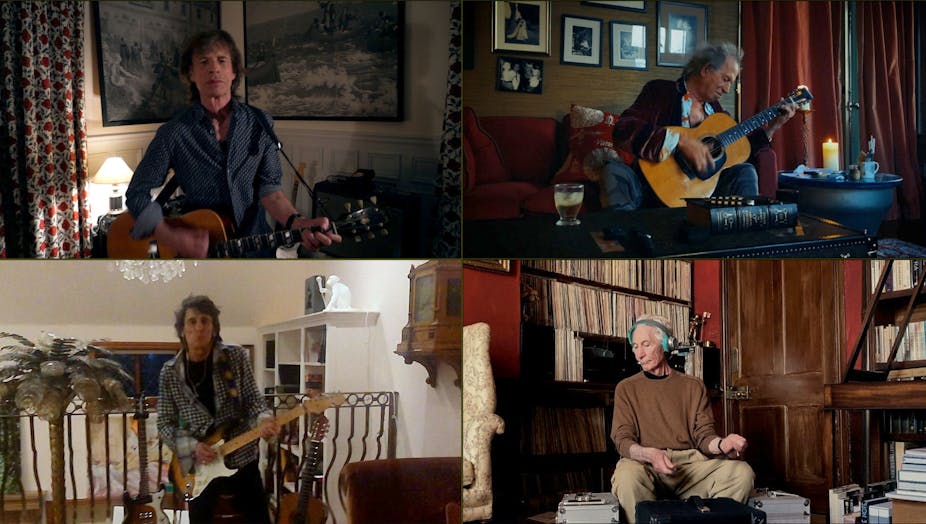Amid wider devastation, the COVID-19 pandemic has wreaked havoc on the musical world. Although online consumption has risen – Spotify, for instance, has seen large growth in paid subscriptions – music-makers are still suffering. Many receive only tiny payouts from streaming sites. And with public gatherings curtailed, concerts, tours and festivals are currently ruled out, jeopardising employment prospects for musicians and the future of shuttered venues.
At the same time, people around the world have turned to music to help them through the crisis. From balcony-based sing-alongs to megastar global broadcasts, music has become embedded in our responses to disrupted lives. With creators and lovers of music depending on digital mediation, a wide range of approaches to making, sharing and experience music have arisen. Here are five such musical responses.
Music about the crisis
Living In A Ghost Town is the Rolling Stone’s first single in four years and their first new original material since 2012. Although the world has changed so much since then, it’s perhaps unsurprising that the response from the venerable Stones to COVID-19 remains fairly close to previous practice.
Written a year ago – and largely drawn from 2019 recording sessions for a forthcoming album – Living In A Ghost Town was rushed into release due to its resonance with the quiet city-centres of the current lockdown, albeit after some re-writing and remote recording.
Topping the iTunes chart in 20 countries could be an early indicator of wider success for the song. And if it’s not quite “business as usual” for the Stones, the release via the Polydor label and canny marketing suggest that established practices haven’t fallen completely by the wayside, and that the old guard have a couple more tricks up their sleeve.
Collaborating at a distance
The Stones may be musical veterans, but they have nevertheless been beaten into the record books by Colonel Tom Moore. Following another record-breaking effort by fundraising more than £29 million for the NHS through walking 100 laps of his garden, the second world war veteran – who turned 100 this week – became the oldest person to top the UK charts.
His cover of Gerry and the Pacemakers’ You’ll Never Walk Alone – with Michael Ball and the NHS Voices of Care Choir – was an example of how musicians are circumventing the physical restrictions of lockdown to collaborate online. Ensembles of all sizes, from bands to local choirs and all the way up to symphony orchestras, have refused to let COVID-19 stand in the way of playing together, turning to a host of software platforms to maintain their collective creativity.
Rediscovering old music together
Collective experience isn’t restricted to musicians, or to the latest online collaboration platforms. It spreads across more widely established social media platforms too. Tim Burgess, lead singer of the Charlatans, has been hosting nightly listening parties on Twitter under the hashtag #timstwitterlisteningparties.
Each session takes a classic album for participants on Twitter to discuss and reminisce about communally as they listen at home. With musicians from the albums in question – such as members of Blur and Oasis – joining in sharing their memories and pictures, Burgess’s listening parties occupy a space between fan engagement, a pub conversation and private listening.
Public service announcements
Not every new release is a career milestone publicity coup like the Stones’ new single, or a record-breaking deployment of the latest communications technology like Captain Moore’s chart topper. Randy Newman’s new song, Stay Away – was a more homespun affair. It was a response to a request from Southern California public radio station KPCC to, as he put it, “say some words about social distancing – because of my scientific background, because apparently there’s some disease that’s going around”.
Celebrities of all stripes, have been using their platforms to reinforce local and national governments’ safety messaging. Newman opted to do so musically, with a characteristically wry combination of public service announcement and love song. Proceeds from the song are donated to a New Orleans music charity founded by jazz legend Ellis Marsalis, who passed away from COVID-19 at the start of the month.
Livestreams for venues
Charity records are not a new development, of course. Charity concerts go as far back as the 18th century and Handel’s fundraising performances of his anthem for the Foundling Hospital in Bloomsbury.
Now, however, it’s music venues that are riven by the current crisis. Hundreds of venues are at risk of permanent closure in the UK alone, with government support not plugging the gap. The question has been one of how to make the broadly distributed experience of online streaming work locally.
Punk-folk singer Frank Turner, a patron of the Music Venue Trust, turned his attention to a specific venue with personal significance for him – The Joiners in Southampton – playing a gig from his home via a Facebook Watch Party that raised over £10,000 for the venue, and staved off its imminent closure.
This has flowered into the Music Venue Trust’s Save Our Venues initiative, which partners venues with artists for targeted fundraising streams that go out on venue, artist and the Save Our Venues websites and social media accounts.
Music makers everywhere have risen to the challenge of COVID-19, providing emotional, financial and cultural resources for quarantined populations. Now though, more than ever before in previous public crises, amongst those whose livelihoods they need to protect are their own.

